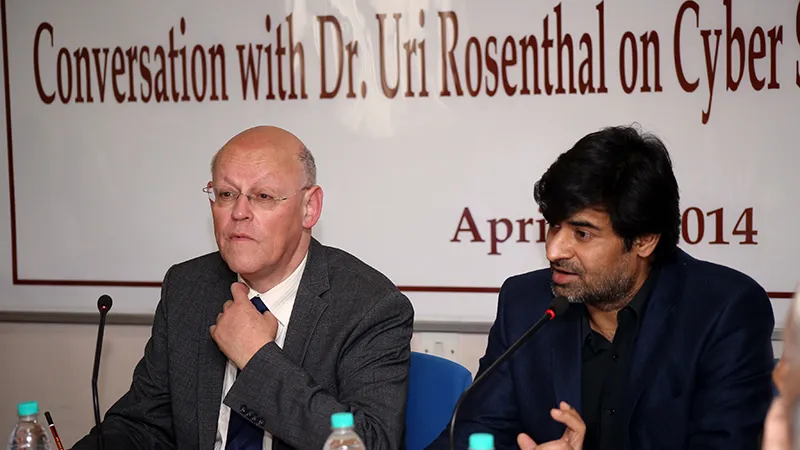-
CENTRES
Progammes & Centres
Location
The Special Envoy for the Fourth Cyberspace Conference in Netherlands, Dr. Uri Rosenthal, says global efforts are required to help create "an open and secure internet that is an engine for growth and innovation and for the benefit of the people."

Global efforts are required to help create "an open and secure internet that is an engine for growth and innovation and for the benefit of the people," said Dr. Uri Rosenthal, Special Envoy for the Fourth Cyberspace Conference, to be held in Netherlands next year.
Delivering a talk on "Cyber Security" at Observer Research Foundation in Delhi on April 16, Dr. Rosenthal emphasised the need for "new thinking" on the part of governments, businesses, and citizens. Talking about cyber challenges, Dr. Rosenthal highlighted three specific issues. First, he talked about the need to promote free access to the open internet. Second, he talked about the importance of the internet to profligate innovation and economic growth. Lastly, he emphasised the need to ensure that internet users have access to a secure internet.
Talking about the need for a free internet, he emphasised the internet’s role as a "marketplace for ideas". Dr. Rosenthal further elaborated on the internet’s critical role as a means to disseminate information. He spoke about how this enables the internet to act as catalyst for innovation and social & economic growth.
Dr. Rosenthal pointed out that global growth was expected to be near-4% to 5% in the next 10 years due to the internet and e-commerce. He also highlighted the role of the internet in bringing social development to remote areas across the world. Considering the important role played by the internet, Dr. Rosenthal stressed the need to find a balance between combating cyber crime and protecting the openness and security of the internet.
Talking about the approaches that could be taken to implement this vision, Dr. Rosenthal proposed a host of ways to do this. He specified the need to take on a multi-stakeholder approach to enable a vast group of stakeholders be a part of and have a say in the growth of the internet. He also talked about the need to internationalise the governance of internet.
Although Dr. Rosenthal talked about the need for the creation of a new governance structure, Dr. Rosenthal still emphasised the need for it to reflect the multi-stakeholder model. In this context, he expressed his belief that states would need to take responsibility in any such structure, but not exclusively.
Dr. Rosenthal argued in favour of increasing the role and say of industry and civil society, among other actors. Furthermore, when considering the role of states, Dr. Rosenthal underlined the explicit need to include developing countries in any discussions pertaining to the internet.
In this regard, Dr. Rosenthal talked about the Fourth Cyberspace Conference in 2015, as part of the London-process. He identified the conference’s main objective as "putting principles into practice." Elaborating upon this point, he emphasised the conference’s role as a platform for discussion on various cyber-related issues. Furthermore, he talked about their hope to mobilise support and assistance for countries that would like to invest in cyberspace, but are unable to. Engagement with a multitude of actors, he said, was critical given the pace of developments and the complexity of the cyber domain.
Dr. Rosenthal’s talk was followed by a discussion on the various issues pertaining to cyberspace and cyber-security. The participants discussed India’s Information Technology Act and issues related to its implementations and enforcement. Furthering the discussion on regulation of cyberspace, the participants emphasised the need to balance regulation and freedom of speech. Despite the difficulty in finding the ideal balance, the participants emphasized the success of cyber innovations such as e-commerce, e-governance, and even e-courts within the Indian context especially. Continuing with the discussion on cyberspace within the Indian context, some participants expressed their appreciation of the increasing role played by civil society in discussing cyber governance.
Discussing the governance of cyberspace, some participants pointed to the efficacy of self-governance. The participants emphasised the need for governments to take a laissez faire approach to cyber-regulation, instead choosing to intervene only when self-regulation fails miserably. Considering the individual in the context of self-regulation, the participants discussed the rise of ’netiquette’ and online ethics and the individual’s responsibility as a ’netizen.’ In this regard, some participants pointed out the importance of cyber hygiene in helping improving cyber security as a whole.
(This report is prepared by Pranay Ahluwalia, Research Intern, Observer Research Foundation, Delhi)
The views expressed above belong to the author(s). ORF research and analyses now available on Telegram! Click here to access our curated content — blogs, longforms and interviews.